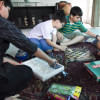How to deal with screen time for children

If you are one of those parents who are killing yourselves with guilt about giving your children too much screen time, you are not alone. It's a busy world and keeping children engaged can sometimes get overwhelming.
If five minutes of break for yourself means five minutes of extra screen time for your baby, here's some heartening news: One of the most comprehensive studies found that in more than 350,000 adolescents, the use of technology was related to only about 0.4 per cent of the overarching differences in their mental wellbeing.
A parenting book found that most successful parents do not worry too much about how much screen time their children get. Instead, they focus on teaching the following habits:
Evaluating media
It's often not about how much they watch as it is about 'what' they watch. Make sure the sites they are going to do not have sneaky links to other sites with violent or adult content. Watch one or two of their favourite videos together. It is important to find out what values these videos are teaching, especially as very young children learn by imitation.
Drawing screen boundaries
This one is for slightly older children, between the ages of 5 and 15. Instead of feeling like either party has too little control over determining the amount of screen time they get, sit together with the child and give them a chance to set their boundaries, especially if the habit is creating unrest between parents and children or affecting their screen time.
This could well turn out to be a negotiation so be prepared for some manipulation, especially if children have to use electronic devices for school work too. Create a roadmap and set strict rules on the privacy of the sites as well as the sort of parental permissions they must take before setting up social media accounts or entering new sites.
Screens for learning
The Internet is a vast avenue with all kinds of information, both good and bad, and it can often be a tool for connection, learning, and growth. Try to steer them away from empty entertainment and towards more informational videos, and content that speaks to their imagination or creativity. These could be DIY videos, tutorials, language learning apps, general knowledge quizzes, etc. Help them apply what they learn to real life so that you have some measurable results to show for the screen time you allowed.

 For all latest news, follow The Daily Star's Google News channel.
For all latest news, follow The Daily Star's Google News channel. 








Comments